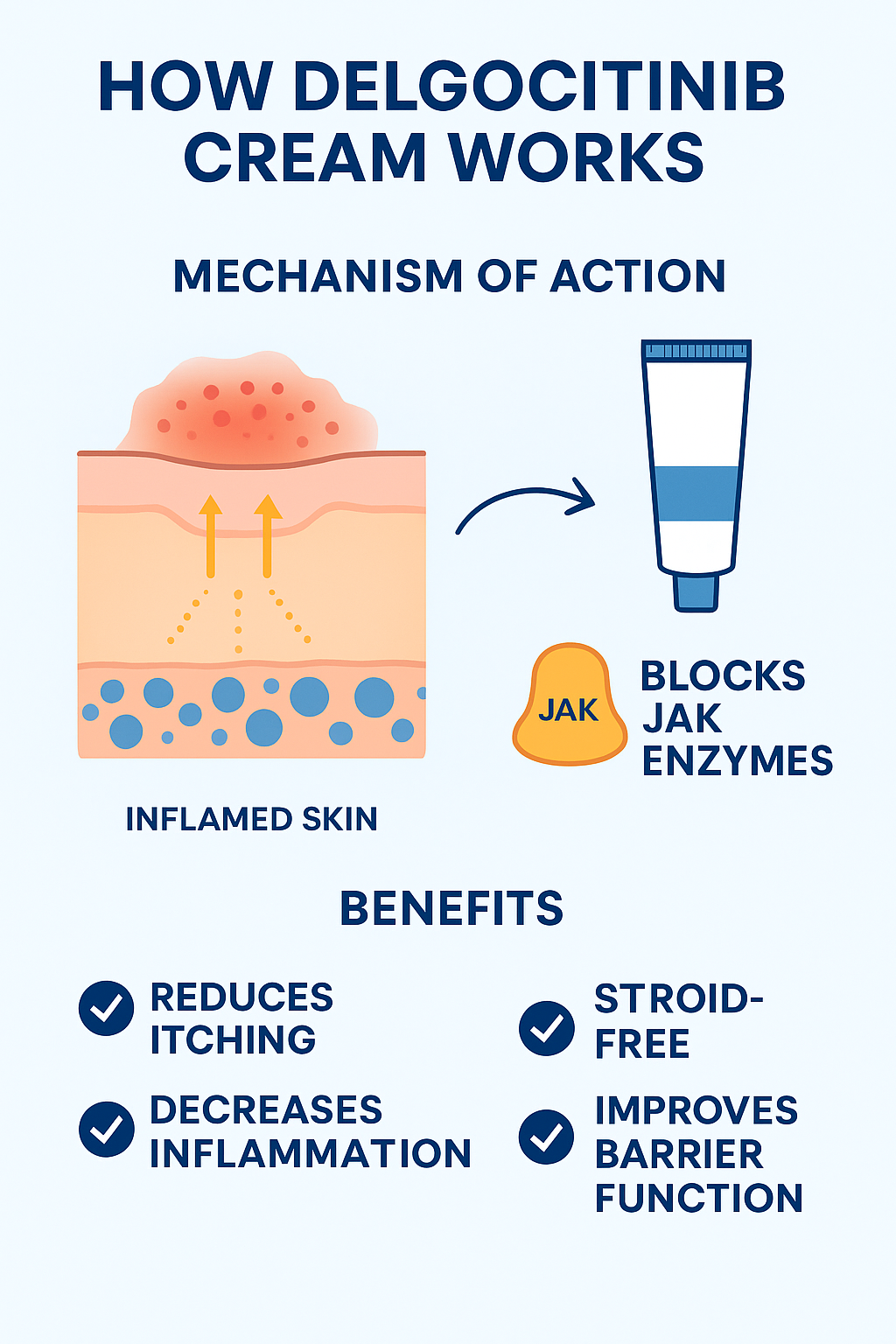Table of Contents
Introduction
In recent years, advances in dermatology have changed how chronic skin conditions such as eczema, dermatitis, and psoriasis are treated. One of the latest innovations is dalgocitinib cream, a topical medication that has garnered attention due to its unique mechanism of action. Unlike traditional steroid-based ointments, dalgocitinib cream targets specific inflammatory pathways, making it a promising option for patients who need long-term skin care without the risk of steroid dependence.
In this detailed blog, we will explore dalgocitinib cream, its mechanism of action, clinical uses, benefits, side effects, and safety guidelines. Whether you are a patient seeking relief or a healthcare professional looking for an evidence-based review, this guide will provide you with comprehensive insights.
What is Delgocitinib Cream?
Delgocitinib cream is a topical Janus kinase (JAK) inhibitor developed for inflammatory skin disorders. It works by blocking multiple JAK pathways (JAK1, JAK2, JAK3, and TYK2), which play a key role in the immune system’s overreaction that causes skin inflammation, itching, and rashes.
- Drug Class: Topical JAK inhibitor
- Formulation: Cream for external use
- Approved Indications: Atopic dermatitis and other chronic inflammatory skin conditions (varies by country)
- Brand Names: Anzupgo
Why is Anzupgo Important?
Chronic dermatitis is not just a cosmetic problem; it can seriously impact a patient’s quality of life. Conventional treatments such as corticosteroids and calcineurin inhibitors have limitations, including side effects such as skin thinning or inflammation.
It offers:
• Steroid-free option for patients requiring long-term management
• Relief from persistent itching and inflammation
• Improved skin barrier restoration compared to standard treatments
• Suitability for pediatric and adult patients (subject to regulatory approval)
Mechanism of Action :
To understand how dalgocitinib cream works, let’s take a quick look at it:
1. Overactive immune system pathway:
In conditions like atopic dermatitis, the immune system produces excessive amounts of cytokines (chemical messengers) that cause itching, redness, and inflammation.
2. JAK-STAT pathway:
These cytokines send signals through the JAK-STAT pathway, which causes inflammation and impairs the skin’s barrier function.
3. Action of dalgocitinib cream:
By blocking JAK enzymes (JAK1, JAK2, JAK3, and TYK2), dalgocitinib cream prevents cytokines from causing inflammation, resulting in reduced itching, redness, and skin lesions.
This multi-targeted JAK inhibition makes dalgocitinib cream unique compared to other topical treatments.

Clinical Uses of Delgocitinib Cream
The primary approved use of Delgocitinib cream is in the treatment of:
1. Atopic Dermatitis (Eczema)
- Reduces itching, redness, and dryness
- Improves skin hydration and barrier function
- Provides steroid-free management for sensitive skin
2. Hand Eczema (Chronic Hand Dermatitis)
- Useful for patients with occupational or chronic hand dermatitis
- Reduces flare-ups in patients resistant to standard treatments
3. Psoriasis (Under Clinical Evaluation)
- Being studied for plaque psoriasis due to its role in immune modulation
4. Other Potential Uses (Investigational)
- Seborrheic dermatitis
- Contact dermatitis
- Lichen planus
Benefits of Delgocitinib Cream
Patients and dermatologists value dalgocitinib cream for several reasons:
✅ Non-steroidal: Safer for long-term use compared to corticosteroids
✅ Rapid itching relief: Many patients report improvement in 1 week
✅ Broad-spectrum: Works on multiple inflammatory pathways
✅ Pediatric use: Can be prescribed for children (based on regulatory approvals)
✅ Minimal systemic absorption: Reduced risk of systemic side effects
How to Use Delgocitinib Cream
• Usage: Apply a thin layer to the affected area twice a day, or as directed by your doctor
• Avoid: Contact with eyes, mouth, or mucous membranes
• Duration: Can be used long-term under medical supervision
• Combination therapy: Can be used with emollients to better hydrate the skin.
Possible Side Effects of Delgocitinib Cream
Delgocitinib cream is generally well tolerated, but some patients may experience:
• Mild reactions at the site of application (burning, stinging, itching)
• Rarely, dry skin or redness
• Increased susceptibility to skin infections due to decreased immunity
• Long-term safety: Still being studied, but current data show a favorable profile compared to steroids.
Safety Precautions
Before using dalgocitinib cream, patients should consider:
• Not for broken/infected skin unless prescribed
• Pregnancy and lactation: Limited data; consult a doctor
• Children: Safe for pediatric use in some regions, but dosage guidance is required
• Concurrent medications: Inform your doctor about any systemic immunosuppressants.
Delgocitinib Cream vs Other Treatments
| Feature | Delgocitinib Cream | Corticosteroid Cream | Calcineurin Inhibitors (Tacrolimus, Pimecrolimus) |
| Mechanism | JAK inhibition | Anti-inflammatory, vasoconstrictive | Immune suppression via T-cell inhibition |
| Long-term use | Safer, non-steroidal | Risk of skin thinning | Burning sensation common |
| Onset of relief | Fast (1 week) | Fast | Moderate |
| Use in children | Approved (region-specific) | Limited due to side effects | Approved but with restrictions |
Current Research and Future Outlook
The role of dalgocitinib cream in clinical trials continues to expand beyond atopic dermatitis. Ongoing studies are exploring:
• Long-term safety profile in diverse populations
• Efficacy in psoriasis and contact dermatitis
• Comparative efficacy with biologics and systemic JAK inhibitors
As more real-world data emerge, dalgocitinib cream has the potential to become a first-line nonsteroidal therapy for chronic skin diseases.
Conclusion
Delgocitinib cream represents a breakthrough in the management of chronic skin diseases such as atopic dermatitis and eczema. Its unique ability to inhibit multiple JAK pathways provides rapid and effective relief while avoiding the long-term complications of steroids.
As more research progresses, delgocitinib cream is expected to gain widespread approval and become a central part of dermatological treatment plans. For patients struggling with persistent skin conditions, this cream offers new hope for healthy, inflammation-free skin.
Frequently Asked Questions (FAQs)
1. What is Delgocitinib cream used for?
2. Is Delgocitinib cream a steroid?
3. Can children use Delgocitinib cream?
4. Does Delgocitinib cream cause skin thinning?
5. How quickly does Delgocitinib cream work?
6. Can Delgocitinib cream be used on the face?
Disclaimer
This article is for educational purposes only and is not a substitute for professional medical advice. Always consult your dermatologist or healthcare provider before starting or changing any treatment.

